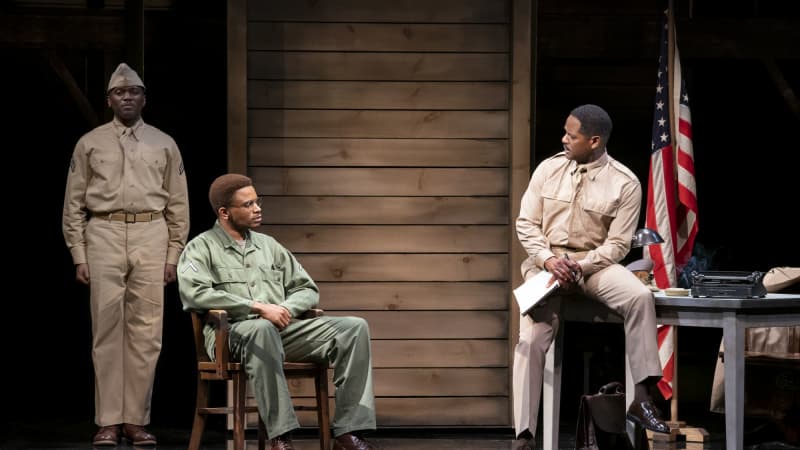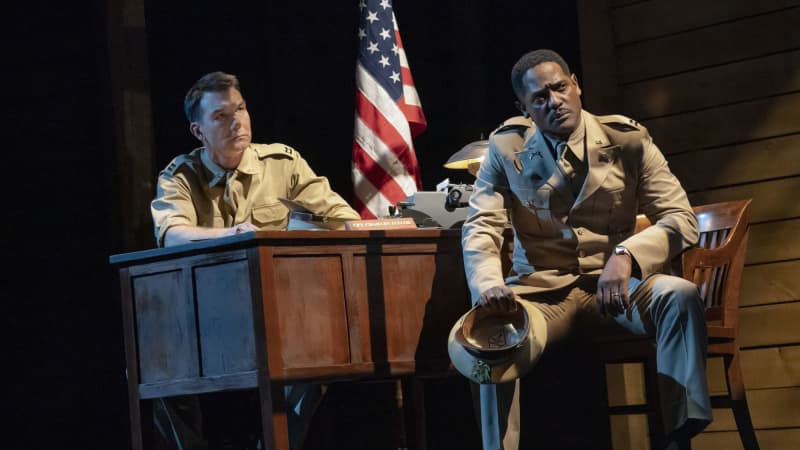A Soldier's Play:
An Interview with Blair Underwood
Posted on: February 12, 2020
Education Dramaturg Ted Sod sat down with Blair Underwood, the actor playing Captain Richard Davenport in A Soldier’s Play.
Ted Sod: Where were you born and educated? Did you have any teachers there who had a profound influence on your work as an artist?
Blair Underwood: I was born in Tacoma, Washington. My dad is now a retired military officer of 28 years, and he was stationed at Fort Lewis. I was only there for the first three months of my life. Because of the military, we moved every two to three years. I grew up in Colorado, Michigan, Germany, Kansas, and Georgia. Having named all those locations where I lived at one time or another, I would have to say we mostly lived in Virginia.
As far as important teachers go, there was Mrs. Warren, my first drama teacher in junior high school, and Marie Maniego, who was my high school mentor. I was trained at Carnegie Mellon University in Pittsburgh, Pennsylvania. Angela D’ambrosia was my acting coach during my second year in college, and she was very instrumental in my growth as an artist. She pushed and challenged me. She was tough. Angela was one of those teachers who students either adored or didn’t. I happened to adore her.
I moved to Los Angeles to start doing film work, and for the first three or four years, I would always go to Angela in order to make sure that I was creating the character in the right way and doing the mechanics of the work because I deeply trusted her perspective.
TS: I read that before your stint in LA, you came to New York City and you had good fortune right away. Is that correct?
BU: That’s true. I could not afford to finish going to Carnegie Mellon. I was caught in the no man’s land where my dad was making too much money for financial aid, but not enough to keep me and my brother in college. So, I left Carnegie Mellon in the middle of my junior year, and Billy Wilson, who was my dance instructor there, introduced me to his agent, Perry Kipperman. She turned me on to “The Cosby Show,” and on my second day in NYC, I had a one-word part on “The Cosby Show” — I said, “Hey!”
TS: I’m curious about why you chose to do the role of Captain Richard Davenport in Charles Fuller’s A Soldier’s Play?
BU: I grew up on various bases, and with my father being an officer, I have a very unique perspective on military life, bearings, personalities, and personas. It is a very specific thing.
TS: What do you think the play is about? And what about the play is relevant to audiences now?
BU: As I see it, it’s a play about survival, race relations, honor, country and duty, self-preservation, self-love, self-hatred, and the schisms between us within and outside of ourselves in our communities. I think it is a very specific, acute look into the dynamics of race and how every element and aspect of race affects how we not only see ourselves, but the world around us.
I came into the industry in the early ‘80s and, for years, while I was building my career, there were a number of times that I would not take a role if it was specifically about race relations. I just wanted to be a man who happened to be Black in the world. A lot of the roles in the ‘80s and ‘90s were asking me to lead with my race.
And now, because of the public and political discourse, people are acutely aware of our differences more than our commonalities. Because of that, a play like this — which is enlightening and reminds the audience of our humanity — is vital.
TS: Can you give us an insight into your process as an actor and the research you have to do to play this part?
BU: With this specific role, my greatest source of research is my life and my relationship with my father.
In the early ‘60s, my dad was an army officer, and that was rare at the time. When I read the play, and I’ve seen the movie, too, it reminds me so much of my life and how people would respond to my father. In the military, your rank trumps everything. So, it doesn’t matter what you look like. When a superior officer is on deck, you salute, and you show respect to the rank. In fact, Davenport says that at one point. When a character responds badly, Davenport says “respect the rank.”
My father had conversations with me when I was growing up. One time, someone with a lower rank than him, who happened to be Caucasian, walked by and begrudgingly saluted. And my dad checked him. The way my father and parents raised us — me, my brother, and my two sisters — was truly to lead with your humanity. It’s truly how we were raised. In terms of preparation for Captain Davenport, my goal is to just be. You just be and you strive for excellence, and that’s the way I live my life — it’s the way I see Captain Davenport living his life as well.
TS: What do you make of this relationship between Captain Davenport and his colleague, Captain Charles Taylor?
BU: I see Taylor as someone who is certainly racist, but he is racist because he is a product of his time. One of the things about being a so-called minority — African Americans are approximately 12-13% of the population — you really have to understand the people who surround you. In other words, Black people have to understand how white people think and operate and live their lives. It’s not the same conversely. White people don’t necessarily have to really understand Black culture, life, characters, people. I think Davenport understands Taylor and his sense of racism and superiority much better than Taylor understands it himself.
TS: Can we talk about Captain Davenport’s relationship to the other Black soldiers? It seems like they don’t trust him because he is part of the power structure, or do you see that differently?
BU: You’re always going to have that sense of pride because someone that looks like you is in a position of power, but then the second blush is thinking — Oh, you’re in a position of authority, which means you can rule me in certain ways, you can have a certain opinion that can affect my livelihood and future. So, I think it’s a mixed bag, but as I see it, it definitely starts with this sense of tremendous pride to have this man of color with this rank among them, who has been assigned the task of solving a murder that occurred on base.

Warner Miller, Nnamdi Asomugha, and Blair Underwood
© Joan MarcusTS: What do you want audiences to take away from this play?
BU: I would love the audience to take away the understanding that everything and everyone is multilayered. There’s much more behind a person’s presentation of themselves than what we see. Even when we point fingers and we blame the “others” — there are usually very deep and profound and complex reasons for that.
What Charles Fuller has written is a play that really uncovers and mines all the human beings featured in it. The play asks audiences to look for why people do what they do. This is a murder mystery, but I am speaking way beyond the murder that takes place. Human behavior — why do people love? Why do people hate? Why do people hate themselves? Why do people hate others who are not like them?
A Soldier’s Play allows all of us to explore the human psyche — especially the psyches of the Black and white men who are at the center of the drama.

Jerry O'Connell and Blair Underwood
© Joan MarcusTS: What do you look for when you work with a director? What’s important to you when you collaborate on a role?
BU: For me, and I feel this in Kenny, a director is someone who has a very strong understanding of the text and the characters and how he or she wants to direct our performances and direct the story in terms of its breadth, width, and depth. What are the messages we want to leave the audience with? How do we want them to think and feel? If we can understand what we are aiming for, then we can all get there collectively.

Blair Underwood and Kenny Leon
© Jeremy DanielTS: How do you keep yourself inspired as an artist?
BU: Just keep challenging myself. Doing something different.
I was doing “Ironside” out here in LA — the reboot of the Raymond Burr series — and it was one of those projects that was on the air for three weeks because they ended up canceling it. There was not much of an opportunity to see what it could really do. After that experience, I got really burnt out and I had to remind myself why I’m doing this in the first place. So, I took a year off and went away to do what I love to do — which is the theatre. I wanted to get back on the boards and didn’t want to see a camera for at least a year. During that year, I played Othello and opposite Cicely Tyson and Vanessa Williams in The Trip to Bountiful.
I needed to remind myself why I’m in the business in the first place. And the answer to myself was that it’s not about the business, it’s about the craft and the work, and the place where you can delve into that more than anywhere else.
TS: Do you have any advice for a young person who says they want to have a career as an actor?
BU: Yes. Dream big, number one. Number two, run to the things that scare you. And number three: use the technology that you have.
